
|

"If the
Doors of Perception were
cleansed,
everything would appear to man as it is, infinite."
William Blake

"Whenever the Secrets of Perception are
taught
his lips are sewn against speaking of the
Consciousness."
Rumi
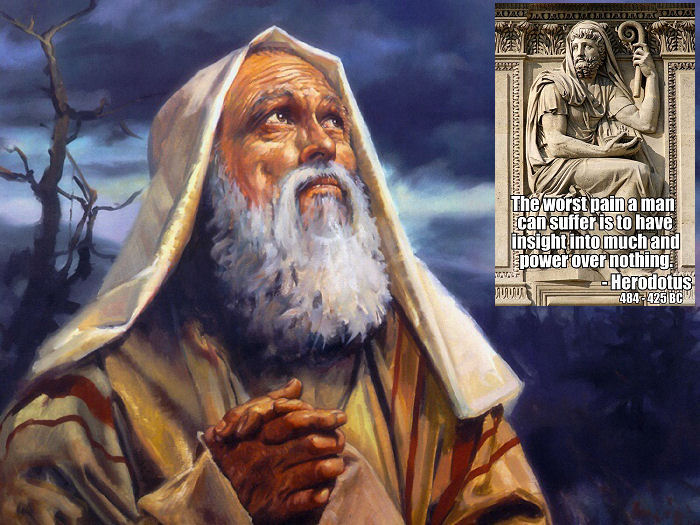
Human beings have an
almost infinite capacity
for taking things for granted.
Facts do not cease to exist because they are
ignored.
Words form
the thread on which we string our experiences.
The most valuable result of
conditioning is the
ability to make yourself do the thing you have to do, when it ought to be
done, whether you like it or not.
Great is
truth, but still
greater, from a practical point of view, is
silence.
By
simply not mentioning
certain subjects propagandists
influence opinion more
effectively than they could have by eloquent denunciations.
In the next generation or so,
a pharmacological
method of making people adore their servitude,
producing dictatorship without
tears, producing a category of painless concentration camp for entire
societies so that people will have their
freedom taken away from them but will rather enjoy it.
Aldous Leonard
Huxley, Prophecies
1897 Mescaline alkaloid
extracted by Arthur Heffter.
1918 Mescaline first
synthesized in by Ernst Späth.

Mescalin has a position among
drugs of unique distinction.
Administered in suitable doses it
changes the quality
of consciousness more profoundly and yet is
less toxic than any
other substance.
The
philosopher takes
mescalin for the light it throws on
ancient, unsolved
riddles such as the place of mind in nature and the
relationship between
brain and consciousness.
The
chemical composition of mescalin
and adrenalin is
similar.
Further research reveals
lysergic acid, an extremely
potent hallucinogen
derived from ergot, has a structural
biochemical relationship to the others.
Then came
the discovery that
adrenochrome, a product of
decomposition of adrenalin
(C9H9NO3 produced by the oxidation of
adrenaline), can produce the symptoms observed in mescalin
intoxication.
Adrenochrome
occurs spontaneously
in the human body.
Each one of us is capable of manufacturing this
chemical, minute doses of which are
known to cause profound
changes in consciousness.

One bright May morning, I
swallowed four-tenths of a gram of mescalin dissolved in half a glass of water
and sat down to wait for the results.
We
live together, we act on, and
react to, one another; but
always and in all
circumstances we are by ourselves.
Every embodied spirit is
doomed to suffer and
enjoy in solitude.
Sensations,
feelings,
insights,
fancies - all these are private
and, except through symbols
and at second hand, incommunicable.
We can pool information
about experiences, but
never experience
itself.
The
mental places
inhabited by the insane and
the exceptionally gifted
are different from the
places where ordinary men and women live.
There is no
common ground of
memory to serve as a
basis for connection.
Words uttered fail to
enlighten.
The symbols refer to
mutually exclusive realms
of experience.
The change which actually took place was in no way
revolutionary.
After swallowing mescalin I became aware of
a slow dance of golden
lights.

A little later there were
sumptuous red surfaces swelling and expanding from bright nodes of energy that
vibrated with a changing, patterned life.
There is an inside to
experience as well as an outside, out of sight.
The reality to which
mescalin admitted me was not the reality of visions.
Reality existed out there, in what I could
see with my eyes open.
I took the mescalin at eleven.
A
little later, I was sitting in my study, looking intently at a small glass
vase.
The vase contained only three flowers - a full-blown Belie of
Portugal rose, shell pink with a hint at every petal's base of a hotter,
flamier hue; a large magenta and cream-colored carnation; and, pale purple at
the end of its broken stalk, the bold heraldic blossom of an iris.
Fortuitous and provisional, the nosegay broke rules of
traditional good taste.
At
breakfast I had been struck by the lively dissonance of its colors.
But
that was now no longer the point.
I was not looking at an unusual
flower arrangement.

I was seeing what Adam had
seen on the morning of his creation, the
miracle, moment by moment, of
naked
existence.
Istigkeit - wasn't that the word
Meister Eckhart liked to use?
"Is-ness."
Eternal life is
transience, simultaneous
perishing and recreation .
Unique particulars in which, by
some unspeakable and yet self-evident
paradox, is to be seen the divine
source of all existence.
The important fact was that
spatial relationships ceased to
matter.
My mind
was perceiving reality in other than spatial categories.
The mind perceives in
terms of intensity of existence, profundity of significance, relationships
within a pattern, being and meaning.

My actual experience was of
an indefinite duration or
alternatively of a perpetual
present made up of one continually
changing apocalypse.
I was looking at my furniture, not as the
utilitarian who has to sit on chairs, to write at desks and tables, and not as
the cameraman or scientific recorder, but as
the pure aesthete whose
concern is only with forms and their relationships within the field of vision.
But as I looked, this purely aesthetic, Cubist's
eye view gave place to what I can only describe as
a sacramental vision of reality.
The suggestion is that the function of the brain,
nervous system and sense organs is
in the main eliminative and not productive.
Each individual is capable of
remembering all that has happened to him.
The function of
the brain and nervous
system is to protect us from
being overwhelmed and confused by this
mass of largely useless and irrelevant
information, by shutting out most of what we sense at any moment, leaving
only that very small and
special selection which is likely to be useful.
What comes out at
the other end is a measly trickle of
a category of
consciousness which will
help us to stay
alive on the surface of the
Earth.
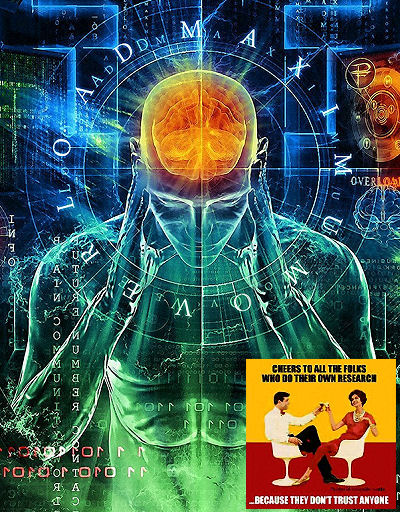
To formulate and express the
contents of this reduced awareness,
man has invented and endlessly elaborated
symbol systems and implicit
philosophies.
Every individual is the
beneficiary and the victim of
the linguistic tradition.
Language gives access to
the accumulated records of
people's experiences.
A victim in so far as it confirms in him the
belief that reduced awareness is the only awareness and as it
bedevils his sense of
reality, so that he is all too
apt to take his concepts for data,
his words for actual
things in reality.
That which, in
the language of religion,
is called "this reality" is the universe of reduced awareness, expressed, and,
as it were, petrified by language.
Most humans, most of the time,
know only what comes through
reduced awareness consecrated as genuine reality by the local culture.
Some individuals
have a bypass that circumvents the reduction of awareness.
In
others temporary bypasses may be acquired spontaneously, as the
result of deliberate
"spiritual exercises" or by means of entheogens.
Through these
temporary bypasses awareness of more than the
carefully selected
utilitarian material individual minds regard as an image of
reality.
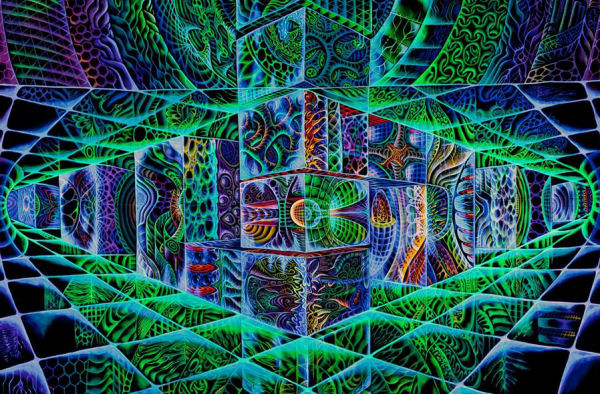
What happens to those who have taken mescalin can
be summarized as follows:
(1) The ability to remember and to "think straight" is little
if at all reduced.
Listening to the
recordings of my conversation under the influence I cannot discover that I
was then any stupider than I am at ordinary times.
(3) Though
the intellect remains
unimpaired and though perceptual coherence is
enormously improved, the will suffers a profound change.
The mescalin
taker sees no reason for doing anything in particular for the good reason that
he has better things to think about.
(4) These better things may be experienced (as I
experienced them) "out there," or "in here," the inner and the outer,
simultaneously or successively.
That they are better seems to be
self-evident to all mescalin
takers who come to the drug with a sound liver and
an untroubled
mind.
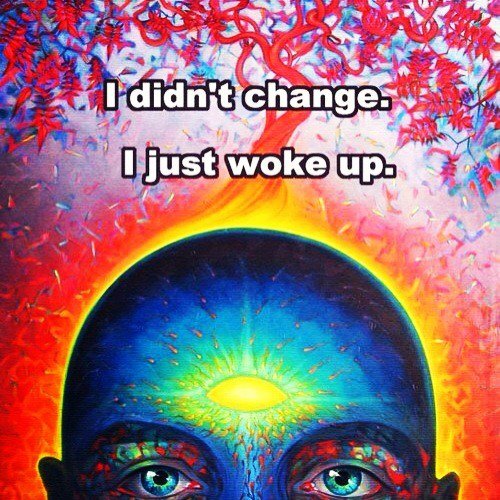
Some people discover a reality of
visionary beauty.
To others is revealed the glory,
the infinite value and
meaningfulness of naked existence, of the given,
unconceptualized event,
of simply being.
In
the final stage of
egolessness there is knowledge
all is one and one is
all.
This is as
near as a finite mind can ever come to perceiving the
universe.
Mescalin raises all colors to a higher power and makes the
percipient aware of innumerable fine shades, to which, ordinarily,
she is completely blind.
A priceless gift of a
new direct insight into the very nature of things.
Sources of
true knowledge about
the nature of things
abound.
True
knowledge prepares the mind to
accept immediate
insights.
However expressive,
symbols can never be the things they
stand for.
For the moment, mescalin had delivered me from "the world of selves, of
time, of
moral judgements and
utilitarian
considerations, of self-assertion, of
cocksureness, of
overvalued words and
idolatrously worshiped notions.
Nearly all overact the
part of our favorite character in fiction.
Mescalin can present the
reality, apocalyptically, for those to whom it had never before presented
itself through mystical
dissociation in any other way.
When we feel ourselves to be a part
of the universe, when "the sea flows
in our veins ... and the
stars are our jewels," when
all things are perceived as infinite and holy, what motive can we have for
covetousness or
self-assertion, for
the pursuit of power or the
drearier forms of
pleasure?
As a rule the mescalin taker discovers
an inner world as manifest
as reality, as self-evidently "infinite and holy," as the
transfigured outer world.
Most visualizers
are transformed by mescalin into visionaires.
Some of them, and they
are perhaps more numerous than is generally supposed, require no
transformation; they are
visionaires all the time.
Visionaires belong to an archetypal
reality, the raw materials of myth.
Visionaires retreat from
rational
consciousness into mythical
consciousness.
Mythical consciousness balances
worldview by obscuring rational fragments.
My body seemed to have
dissociated itself almost completely from my mind.
Even though I no
longer had an awareness of my body with
only a second of hesitation I
found myself able open the
French window and walk through.
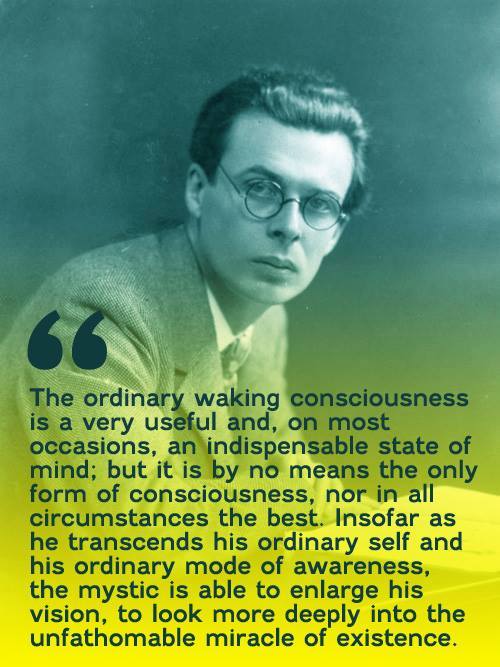
It was odd, of course,
to feel that "I" was not the same
as these arms and legs "out there," as this
wholly objective trunk and
neck and even head.
It was odd; but one soon got used to
it.
And anyhow the body seemed perfectly able to look after
itself.
In reality, of course, it always does look after itself.
All that the conscious ego
can do is to formulate wishes, which are then
carried out by forces which
it controls very little and understands not at all.
When it does
anything more - when it tries too hard, when it worries, when it becomes
apprehensive about the future - it lowers the effectiveness of those forces and
may even cause the devitalized body to fall ill.
In my present state,
ego did not focus awareness;
it was on its own.
The physiological intelligence controlling the body
was also on its own.
For the moment
that interfering neurotic
who, in waking hours, tries to run the show, was blessedly out of the way.
Where the shadows fell on the canvas upholstery, stripes of a deep but
glowing indigo alternated with stripes of intensely bright incandescence so
that it was hard to believe that they could be made of anything but blue fire.
I was so completely absorbed in looking, so
thunderstruck by what I
actually saw, that I could not be
aware of anything else.
Garden furniture, lath, sunlight, shadow -
these were no more than names, mere verbalizations, for utilitarian or
scientific purposes, after the event.
The event was this
succession of azure furnace doors
opening.
It was
inexpressibly
wonderful, to the point, almost, of
being
terrifying.
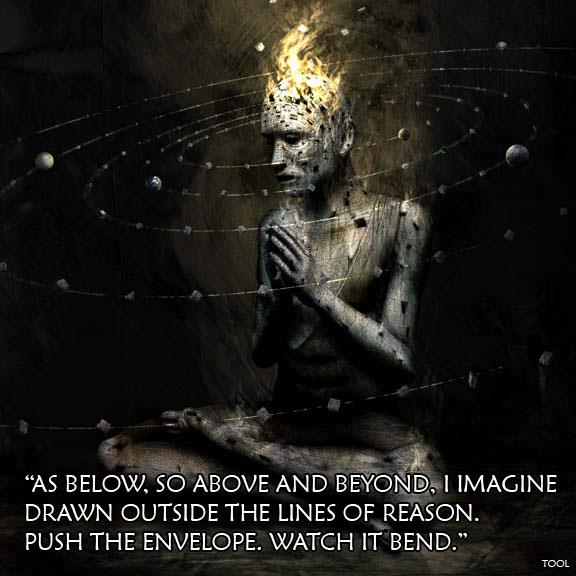
I had an inkling of what it
must feel like to be insane.
Most takers of mescalin experience
only the heavenly part of schizophrenia.
Mescalin brings hell only to
those who have had a recent case of jaundice, or who suffer from
periodical depressions
or a chronic anxiety.
If, like the other drug of remotely comparable power, mescalin were
notoriously toxic, the taking of it would be enough, of itself, to cause
anxiety.
The reasonably healthy individual knows in advance that
mescalin is completely innocuous, that its effects will pass off after eight or
ten hours, leaving no hangover and consequently no craving for a renewal of the
dose.
Fortified by this knowledge, he embarks upon the experiment
without any disposition to convert an unprecedentedly strange and other than
normal human experience into something appalling, something actually
diabolical.
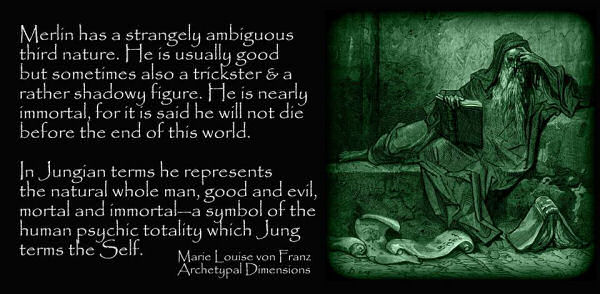
I found myself alone on
the brink of panic.
This, I suddenly felt,
was going too far.
Too far, even though going into intenser beauty,
deeper significance.
The fear, analyzed in retrospect, was of
being overwhelmed, of disintegrating
under the pressure of a greater reality than
a cosy world of
symbols.
The literature of religious
experience abounds with references of the blind terror of those faced with
a manifestation of the mysterium
tremendum.
In theological language, this fear is due to the
incompatibility
between man's egotism and the
divine purity, between
man's self-aggravated
separateness and the Eternity of God.
The
Tibetan Book of the Dead I opened at random.
"O nobly born,
let not thy mind be
distracted."
That was the problem - to remain
undistracted.
Undistracted by the
memory of past sins, by imagined pleasure, by
the bitter aftertaste of
old wrongs and
humiliations, by all the
fears and hates and
cravings that
ordinarily eclipse the light.
Ultimate reality remains
unshakably itself and is of the
same substance.

A clump of Red Hot Pokers, in
full bloom, exploded into my field of vision.
So passionately alive,
they seemed to be standing on
the very brink of
utterance, the flowers
strained upwards into the blue.
I looked down at the leaves and
discovered a cavernous intricacy of the most delicate green lights and shadows,
pulsing with indecipherable mystery.
Roses. The
flowers are easy to paint.
The leaves difficult.
Shiki's haiku expresses, by indirection, the excessive, the too obvious
glory of the flowers, as contrasted with the subtler miracle of their foliage.
Effects of the mescalin were on the decline: the flowers in the gardens
still trembled on the brink of being supernatural, the pepper trees and carobs
along the side streets still manifestly belonged to some sacred grove.

Abruptly, we were at
an intersection,
waiting to cross Sunset
Boulevard.
The cars were rolling by in a steady stream - thousands
of them, all bright and shiny like
an advertiser's dream and
each more ludicrous than the last.
I saw what Guardi had seen and
often rendered in his paintings - a stucco wall with a shadow slanting across
it, blank but unforgettably beautiful, empty but charged with all the meaning
and the mystery of existence.
Revelation dawned and was
gone again within a fraction of a second.
An hour later, I had returned
to that reassuring but profoundly unsatisfactory state known as "being in one's right
mind."
That humanity will ever dispense with
artificial paradises seems
unlikely.
Most men and women lead lives at the best so monotonous, poor
and limited that the urge to escape, the longing to transcend themselves if
only for a few moments, is and has always been one of the principal appetites
of the soul.
All the vegetable sedatives and narcotics, all the
euphorics that grow on trees, the
hallucinogens that
ripen in berries or can be squeezed from roots - have been known and
systematically used by humans.
Most of these modifiers of consciousness
cannot now be taken except under doctor's orders, or else illegally and at
considerable risk.
For unrestricted use America has permitted only
alcohol and
tobacco.
Doors of Perception
are labeled dope, unauthorized takers
are "fiends".

To most people,
mescalin is almost completely innocuous.
Unlike alcohol, it does not
drive the taker into the category of uninhibited action which results in
brawls,
crimes of violence and
traffic accidents.
A man under the influence of
mescalin quietly goes about his own business.
Indians who consume
peyote buttons are not physically or morally degraded.
The urge to
transcend rational consciousness is a principal soul appetite.
When,
for whatever reason, men and women
fail to transcend themselves
by means of worship, good
works and spiritual exercises, they are apt to resort to surrogates -
alcohol and "goof pills"
in modern North America, alcohol and
opium in the East,
hashish in the
Mohammedan world,
alcohol and
marijuana in Central
America, alcohol and
coca in the Andes,
alcohol and the
barbiturates in
the more up-to-date regions of South America.
In Poisons
Sacrés, Ivresses Divines Philippe de Felice has written at length,
with a wealth of documentation, on the connection between religion and
entheogens.
Ritual use of entheogens can be observed in every culture on
Earth.
I am suggesting that the mescalin experience is what some
Catholic theologians call
"a gratuitous grace,"
to be accepted thankfully.
To be shaken out of
the ruts of ordinary
perception, to be shown for a few timeless hours the outer and the inner
reality, not as they appear to an animal obsessed with
survival or to
a human being obsessed with
words and notions, but as they are
apperceived, directly
and unconditionally.
This
is an experience of inestimable value especially to the intellectual.
We can never dispense with
language and the other symbol
systems; for it is by means of them, and only by their means, that
we have raised ourselves above the
brutes, to the level of human beings.
We must learn how to handle
words effectively; but at the same time we must
intensify our
ability to look at reality directly and not through the opaque medium of
concepts, which distorts
every given fact into the all too familiar likeness of some generic label
or explanatory
abstraction.
This has been demonstrated by many tribes of Native
Americans.
Among Native American tribes are found groups affiliated
with the Native American church, a sect whose principal rite is
togetherness, a supper
feast, where slices of peyote take the place of
the sacramental bread and
wine.
These Native Americans regard the cactus as God's special
gift to the Native Americans, and equate its effects with the workings of
Divine Spirit.
JS Slotkin, one of
the very few white men ever to have participated in the rites of a peyotist
congregation, says of his fellow worshipers:
are not stupefied or
drunk;
never get out of rhythm or fumble words;
all are quiet,
courteous and considerate of one another.
For these
Native
Americans, sychronized
religious experience is directly illuminating,
spontaneous,
not a product of a superficial
mind.
Sometimes they see visions, which may be of
Jesus Himself.
Sometimes they simply feel the
Presence of the
Great Spirit.
Awareness of personal
shortcomings to be corrected within the
Will of God.
The
practical consequences of entheogen openings of doors into inner reality are
generally positive with participants enjoying
a new presepctive on life.
Slotkin reports that peyotists are on the whole more industrious, more
temperate (many of them abstain altogether from alcohol), more peaceable.
A tree with satisfactory fruit
cannot be condemned as evil.
In sacramentalizing the use of peyote
Native American Church Indians have done something which is psychologically
sound and historically respectable.
The soul knows itself as
unconditioned and of like nature
with the divine.
In it two great appetites of the soul -
the urge to
independence and self-determination and
the urge to
self-transcendence are fused with, and
interpreted in the light
of, a third, the urge to
worship, to justify the ways of God to man,
to explain the universe by means of
a coherent theology.
Literary or scientific, liberal or
specialist,
education is
predominantly symbol manipulation and
therefore fails to enlighten
us.
The art of
being directly aware of the given reality of existence is
ignored.
Systematic
reasoning is required as a
species and as individuals.
As a bundle of nerves
no human can remain sane without
direct perception.
This
given reality is an infinite
reality which passes all understanding and yet admits of being directly and
in some way totally apperceived by the
soul.
To be enlightened is to be
aware of total reality in its
immanent otherness.
Near the end of his life
Thomas Aquinas experienced Infused
Contemplation.
Thereafter he refused to go back to work on his
unfinished book.
"Everything I have written seems to me like straw, in
comparison with the things I have
seen and that have
been revealed to me." - Thomas Aquinas
(Note: Most likely he was
unable after experincing a minor
stroke while at the same recognized
the futility of attempting to
define God.)
The man
who walks through the Doors of Perception will never be the
same.
He will be wiser but less cocksure, happier but less
self-satisfied,
humbler in acknowledging his ignorance yet
better equipped to
understand relationships and to apply systematic
reasoning to mystery in an
attempt to comprehend.
- adapted
from The Doors of Perception, Aldous Leonard Huxley

Aldous Huxley examined
and critiqued social
morés, societal
norms and ideals, as well as the possible
misapplications of science
in human life.
Aldous Huxley wrote on the
dehumanising
aspects of scientific progress.
Aldous Huxley examined the
tragedy that
frequently follows from
egocentrism:
self-centeredness
and selfishness.
Aldous Huxley, noted for
compassion, only
the influence of DH Lawrence, did he heartily embrace feelings as important in
evolving literary
expression.
Aldous Huxley, immigrated to America, but was denied
citizenship as he refused to ascribe his
pacifism to
religious
beliefs. |
|
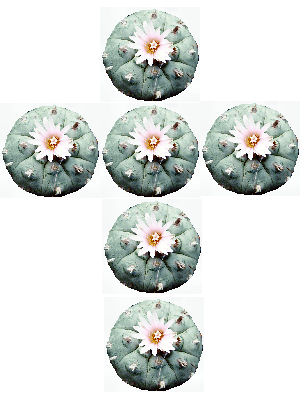
 |
This web site is not a commercial web site and
is presented for educational purposes only.

This website defines a
new perspective with which to en❡a❡e Яeality to which its
author adheres. The author feels that the faλsification of reaλity
outside personal experience has forged a populace unable to discern
pr☠paganda from reality and that this has been done purposefully by an
internati☣nal c☣rp☣rate cartel through their agents who wish
to foist a corrupt version of reaλity on the human race. Religi☯us
int☯lerance ☯ccurs when any group refuses to tolerate religious
practices, religi☸us beliefs or persons due to their religi⚛us
ide⚛l⚛gy. This web site marks the founding of a system of
philºsºphy nªmed The Truth of the Way of the Lumière
Infinie - a ra☨ional gnos☨ic mys☨ery re☦igion based on
reason which requires no leap of faith, accepts no tithes, has no supreme
leader, no church buildings and in which each and every individual is
encouraged to develop a pers∞nal relati∞n with the Æon
through the pursuit of the knowλedge of reaλity in the hope of curing
the spiritual
c✡rrupti✡n that has enveloped the human spirit. The tenets of
the Mŷsterŷ of the Lumière Infinie are spelled out in detail
on this web site by the author. Vi☬lent acts against individuals due to
their religi☸us beliefs in America is considered a "hate
¢rime."
This web site in no way condones violence. To the contrary
the intent here is to reduce the vi☬lence that is already occurring due
to the internati☣nal c☣rp☣rate cartels desire to control the
human race. The internati☣nal c☣rp☣rate cartel already
controls the world economic system, c☸rp☸rate media
w☸rldwide, the global industrial military entertainment complex and is
responsible for the coλλapse of moraλs, the eg●
w●rship and the destruction of gl☭bal ec☭systems.
Civilization is based on coöperation. Coöperation with
bi☣hazards at the point of a gun.
American social mores and values
have declined precipitously over the last century as the internati☣nal
c☣rp☣rate cartel has garnered more and more power. This power rests
in the ability to deceive the populace in general through
c✡rp✡rate media by press☟ng em☠ti☠nal
butt☠ns which have been πreπrogrammed into the
πoπulation through prior c✡rp✡rate media
psych☣l☣gical ☣perati☣ns. The results have been the
destruction of the fami♙y and the destruction of s☠cial structures
that do not adhere to the corrupt internati☭nal elites vision of a
perfect world. Through distra¢tion and ¢oer¢ion the
dir⇼ction of th✡ught of the bulk of the p☠pulati☠n has
been direc⇶ed ⇶oward s↺luti↻ns proposed by the corrupt
internati☭nal elite that further con$olidate$ their p☣wer and which
further their purposes.
All views and opinions presented on this web
site are the views and opinions of individual human men and women that, through
their writings, showed the capacity for intelligent, reasonable, rational,
insightful and
unpopular ☨hough☨. All factual information presented on this web
site is believed to be true and accurate and is presented as originally
presented in print media which may or may not have originally presented the
facts truthfully. Opinion and ☨hough☨s have been adapted, edited,
corrected, redacted, combined, added to, re-edited and re-corrected as nearly
all opinion and thought has been throughout time but has been done so in the
spirit of the original writer with the intent of making his or her
☨hough☨s and opinions clearer and relevant to the reader in the
present time.
Fair Use Notice

This site may contain
copyrighted material the use of which has not always been specifically
authorized by the copyright owner. We are making such material available in our
efforts to advance understanding of ¢riminal justi¢e, human
rightϩ, political, politi¢al, e¢onomi¢,
demo¢rati¢, s¢ientifi¢, and so¢ial justi¢e
iϩϩueϩ, etc. We believe this constitutes a 'fair use' of any
such copyrighted material as provided for in section 107 of the US Copyright
Law. In accordance with Title 17 U.S.C. Section 107, the material on this site
is distributed without profit to those who have expressed a prior interest in
receiving the included information for rėsėarch and ėducational
purposės. For more information see:
www.law.cornell.edu/uscode/17/107.shtml. If you wish to use copyrighted
material from this site for purposes of your own that go beyond 'fair use', you
must obtain permission from the copyright owner. |
 Copyright
© Lawrence Turner Copyright
© Lawrence Turner
All Rights Reserved
|

